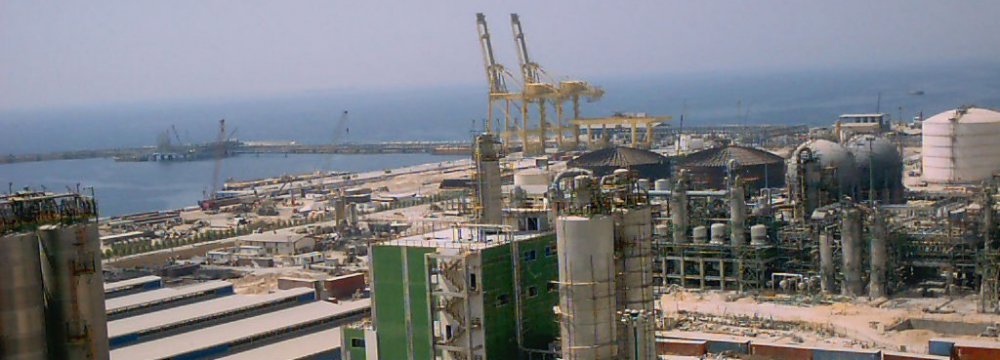
Jam Petrochem Co. Ups HSE Spending

Hassan Mirafzali, managing director of the company, made the statement on Sunday while addressing a panel on combating environmental pollution in Tehran, ILNA reported.
Pointing to the significance of implementing environmental conservation initiatives, Mirafzali said, "Plans are in place to undertake process safety management project whose major objective is to prevent unwanted releases of hazardous chemicals, especially into locations that could expose employees and others to serious hazards."
Process safety management (PSM) is the proactive identification, evaluation and mitigation or prevention of chemical release that could occur as a result of failures in processes, procedures or equipment. The standard targets highly hazardous chemicals that have the potential to cause a catastrophic incident.
According to the official, employees involved in health, safety and environment (HSE) sector should be familiar with manufacturing petrochemical procedures, as it aids them in their efforts to prevent or mitigate episodic chemical releases that could lead to a catastrophe in the workplace and possibly in the surrounding community.
Mirafzali added that to control these types of hazards, employers need to develop the expertise, experience, judgment and initiative within their workforce to properly implement and maintain an effective PSM program.
"As long as HSE personnel are not well-trained, plants' profit margin will be at stake as high physical requirements of working in the heavy industry and the polluting nature of fossil fuels can lead to irrevocable catastrophes," he said.
"Efficient health and safety at workplace not only ensures that employees are happy and productive, but can also help reduce both the human and business costs of injuries and unnecessary lawsuits."
Popular Polymers
According to Mirafzali, JPC has succeeded in producing a high grade of polyethylene that will cut down the import of one of the world's most popular polymers.
"Production of pipe-grade high density polyethylene at JPC has reached a stable rate and domestic petrochemical companies will no longer need to import the product," he said, adding that the procurement of catalysts is the single most important challenge for producing a wide range of chemical and petrochemical products. The production of most industrially important chemicals involves catalysis. Selecting the right catalyst for each product is a crucial issue, because an error in the catalyst can shut down a whole petrochemical complex.
The material displays improved performance in a variety of piping applications. Polyethylene is the world's most versatile and widely produced polymer. High density polyethylene is used for producing plastic bottles, corrosion-resistant piping, geomembranes and plastic lumber.
JPC is also producing a high density grade of polyethylene used for producing the so-called PE100 pipes that possess higher long-term strength and are used in oil, gas, water and wastewater pipeline networks.
Jam Petrochemical Company owns some of the largest petrochemical facilities in the southern port city of Asalouyeh in Bushehr Province. It is one of the world's biggest producers of wide-ranging olefins, according to the company's website.


Trump weighs using $2 billion in CHIPS Act funding for critical minerals

Codelco cuts 2025 copper forecast after El Teniente mine collapse

Electra converts debt, launches $30M raise to jumpstart stalled cobalt refinery

Barrick’s Reko Diq in line for $410M ADB backing

Abcourt readies Sleeping Giant mill to pour first gold since 2014

Nevada army depot to serve as base for first US strategic minerals stockpile

SQM boosts lithium supply plans as prices flick higher

Viridis unveils 200Mt initial reserve for Brazil rare earth project

Tailings could meet much of US critical mineral demand – study

Kyrgyzstan kicks off underground gold mining at Kumtor

Kyrgyzstan kicks off underground gold mining at Kumtor

KoBold Metals granted lithium exploration rights in Congo

Freeport Indonesia to wrap up Gresik plant repairs by early September

Energy Fuels soars on Vulcan Elements partnership

Northern Dynasty sticks to proposal in battle to lift Pebble mine veto

Giustra-backed mining firm teams up with informal miners in Colombia

Critical Metals signs agreement to supply rare earth to US government-funded facility

China extends rare earth controls to imported material

Galan Lithium proceeds with $13M financing for Argentina project

Kyrgyzstan kicks off underground gold mining at Kumtor

Freeport Indonesia to wrap up Gresik plant repairs by early September

Energy Fuels soars on Vulcan Elements partnership

Northern Dynasty sticks to proposal in battle to lift Pebble mine veto

Giustra-backed mining firm teams up with informal miners in Colombia

Critical Metals signs agreement to supply rare earth to US government-funded facility

China extends rare earth controls to imported material

Galan Lithium proceeds with $13M financing for Argentina project

Silver price touches $39 as market weighs rate cut outlook

















